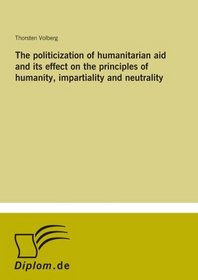Search -
The politicization of humanitarian aid and its effect on the principles of humanity, impartiality and neutrality
The politicization of humanitarian aid and its effect on the principles of humanity impartiality and neutrality
Author:
MA-Thesis / Master, die am 01.11.2006 erfolgreich an einer Universität in Deutschland im Fachbereich Institut für Friedenssicherungsrecht und Humanitäres Völkerrecht, IFHV eingereicht wurde. Abstract: The past two decades have seen a significant increase in frequency and intensity of complex emergencies and natural disasters, leading to a rapi... more »
Author:
MA-Thesis / Master, die am 01.11.2006 erfolgreich an einer Universität in Deutschland im Fachbereich Institut für Friedenssicherungsrecht und Humanitäres Völkerrecht, IFHV eingereicht wurde. Abstract: The past two decades have seen a significant increase in frequency and intensity of complex emergencies and natural disasters, leading to a rapi... more »
ISBN-13: 9783836601818
ISBN-10: 3836601818
Publication Date: 1/1/2006
Pages: 88
Rating: ?
ISBN-10: 3836601818
Publication Date: 1/1/2006
Pages: 88
Rating: ?
0 stars, based on 0 rating
Publisher: Diplomarbeiten Agentur diplom.de
Book Type: Paperback
Members Wishing: 1
Reviews: Amazon | Write a Review
Book Type: Paperback
Members Wishing: 1
Reviews: Amazon | Write a Review




